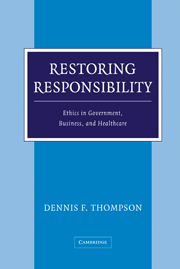Book contents
- Frontmatter
- Contents
- Acknowledgments
- Restoring Responsibility
- Introduction: The Need for Institutional Responsibility
- PART I DEMANDS OF INSTITUTIONAL POLITICS
- PART II VARIETIES OF INSTITUTIONAL FAILURE
- Part III EXTENSIONS OF INSTITUTIONAL RESPONSIBILITY
- 11 Restoring Distrust
- 12 The Institutional Turn in Professional Ethics
- 13 Hospital Ethics
- 14 Conflicts of Interest in Medicine
- 15 The Privatization of Business Ethics
- 16 Democratic Theory and Global Society
- Credits
- Index
15 - The Privatization of Business Ethics
Published online by Cambridge University Press: 29 January 2010
- Frontmatter
- Contents
- Acknowledgments
- Restoring Responsibility
- Introduction: The Need for Institutional Responsibility
- PART I DEMANDS OF INSTITUTIONAL POLITICS
- PART II VARIETIES OF INSTITUTIONAL FAILURE
- Part III EXTENSIONS OF INSTITUTIONAL RESPONSIBILITY
- 11 Restoring Distrust
- 12 The Institutional Turn in Professional Ethics
- 13 Hospital Ethics
- 14 Conflicts of Interest in Medicine
- 15 The Privatization of Business Ethics
- 16 Democratic Theory and Global Society
- Credits
- Index
Summary
During a conference on business ethics for corporation executives, the director of a large supermarket chain enthusiastically declared that he was in favor of more ethics in business. He then described a problem faced by many of his store managers in poorer urban areas: some customers were taking shopping carts home and using them as baby carriages. He commented:
We must teach customers that it is unethical to take shopping carts. I realize we should not blame them now, because they may not understand that it is wrong – that it is really stealing – to take the carts. But better training in ethics will help them to understand this and become better people.
No doubt this executive was sincere, and no doubt it would be better if customers did not steal shopping carts (for whatever reason). But to think of ethics first in these terms is misguided, and misses the larger, more systematic ethical problems in our society.
This executive's approach to ethics is a common way of thinking about ethics that in various forms pervades not only the world of business but also much of public life in the United States. It reflects a tendency to make individual ethics the only kind of ethics in public life. Individual ethics refers to the moral principles that guide the face to-face relations of individuals – the ethics of the family, friendship, small groups, and the behavior of individuals in society generally. It is to be distinguished from institutional ethics, which governs the relations among individuals as members of organizations and as citizens.
- Type
- Chapter
- Information
- Restoring ResponsibilityEthics in Government, Business, and Healthcare, pp. 300 - 317Publisher: Cambridge University PressPrint publication year: 2004

